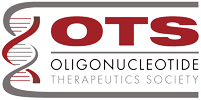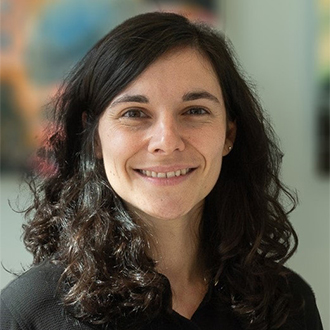
Annabelle Biscans, PhD
AstraZeneca
About Annabelle Biscans, PhD
PERSONAL STATEMENT/MOTIVATION:
My introduction and interest in the oligonucleotide therapeutics world began in 2012 during my PhD at the University of Montpellier, France. When I started my PhD I did not know much about RNA therapeutics but it took me only a few months to become fascinated by the field and realize the transformative nature of RNA therapeutics research. After my graduate studies, I was fortunate to be able to carry out my research in the field as a postdoc in Anastasia Khvorova’s lab at the University of Massachusetts Medical School, USA. There, I acquired expertise in oligonucleotide chemistry, design, and delivery. I made contributions to the field by engineering conjugated fully chemically stabilized oligonucleotides to enhance their delivery into extra hepatic tissues. These incredible opportunities reinforced my strong interest and fascination about the RNA therapeutics field. I attended my first OTS meeting in 2016 in Montreal when I joined Anastasia Khvorova’s lab, and I am trying to attend the annual meetings since then. I discovered an excellent meeting with exceptional science and friendly interaction between academia and industry as well as young and senior scientists. At each OTS meeting, I am always fascinated by how the society does an excellent job of covering the latest breakthroughs in the field from chemistry all the way to oligonucleotides in the clinic. I feel very lucky to be part of the amazing community and be able to share my research at OTS events. I had the great opportunity to present my work via poster presentation (poster award in 2016) and talks (invited 2019 and selected from abstract 2017) as well as to give an OTS webinar on siRNA design in January 2021. I was honored to receive Dr Alan Gewirtz’s memorial scholarship in 2020 for my research work and be an OTS featured member in June 2021. I had the chance to serve on the OTS Board of Directors for the past 4 years which made me realize the importance of the society and its crucial role in bringing together the community and advancing the field. I admire the society values, and I am grateful to have been involved in multiple sub-committees within the society. Especially, I really enjoyed contributing to putting together the OTS mentorship program which I believe is a great opportunity to guide, inspire, and empower future generations of oligonucleotide researchers. Therefore, it will be an honor to serve another mandate on the OTS Board of Directors.
I believe that I could bring valuable insights to the Board as a former Board of Directors member and as a member of the society. I would like to thank you for considering my application and really hope that we could work together to advance the field.
BIOGRAPHY:
I am a Director at AstraZeneca R&D, Sweden, leading the Oligonucleotide Chemistry and Targeted delivery team. My work mainly focuses on the development of safe and efficient oligonucleotide therapeutics to treat diseases with unmet clinical needs. Over the past 13 years, I acquire a robust expertise in designing and developing novel chemical modalities and targeting ligands to improve oligonucleotide therapeutic delivery, efficacy and safety. Before joining AstraZeneca in 2020, I was a postdoctoral associate at the RNA Therapeutics Institute, USA in Anastasia Khvorova’s lab, one of the pioneers in oligonucleotide therapeutics research. There, I made major contributions to the development of novel chemical platforms for enhancing the delivery and uptake of siRNA therapeutics. I was able to design and identify novel conjugated siRNAs that enable safe, sustainable, and robust silencing in various extra-hepatic tissues including muscle, heart, and lung. This crucial discovery allows for the targeting of several new targets for therapeutic intervention and advance the oligonucleotide therapeutics field. In 2015, I obtained my PhD in chemistry from the University of Montpellier (France), where my work focused on the chemical synthesis of RNA prodrugs for the development of new therapeutic oligonucleotides. I established and optimized synthetic methods to successfully synthesize novel 2’-modified siRNAs and demonstrated that incorporation of 2’-biolabile moieties can be efficiently used to improve siRNA stability and uptake without major toxicity.
AFFILIATIONS:
- Member of Oligonucleotide Therapeutics Society (OTS)
- OTS Board of Directors, Secretary, 2021-2025
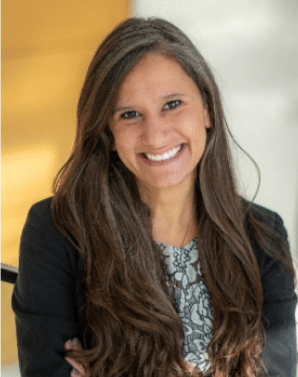
Julia Alterman, PhD
RTI/UMass Chan Medical School
About Julia Alterman, PhD
PERSONAL STATEMENT/MOTIVATION:
I have been attending OTS meetings since I was a Research Associate in Anastasia Khvorova’s Lab in 2014. Through almost a decade of engagement in this community, I have come to revere the OTS as the most important and insightful contributor to the-oligonucleotide therapeutic field. I find the intersection of industry and academia particularly engaging as it supports the community’s goal of realizing the potential of oligonucleotide therapeutics to impact human health, while encouraging innovative new discoveries in chemistry and biology of disease. Over my career, I have gained experience from both industry and academia.I worked for 6 years in two small biotech companies from 2007-2013, after which I earned my PhD at the RNA Therapeutics Institute at UMass Chan Medical School focused on siRNA development for CNS conditions that led to the establishment of a new biotech start up. I learned to appreciate the dedication required to ensure the success of a small biotech company while also grasping the scientific rigor necessary for pre-clinical development of novel therapeutics.
As an Assistant Professor,I am most fascinated by oligonucleotide chemical biology and understanding the role chemistry plays in impacting pharmacokinetics/pharmacodynamics. In this role,I have been working on developing these molecules for use in multiple organ systems(skin, muscle, eye, and bone), often in collaboration with industry partners. I believe that having a broad understanding of both the early research and late-stage pre-clinical work required for the development of successful technologies will complement the society’s mission of fusing both fields for the benefit of science and patients.
In addition to my research experience, I also cherish the opportunities I have had to mentor young scientists and have been part of the OTS mentoring program over the past year.
If given the honor to serve as a board member of the OTS I look forward to supporting the society’s mission by sharing new ideas,helping to build the growing academia-industry relations fueled by OTS,and engaging in trainee development, much like the OTS has done for me.
BIOGRAPHY:
I began my scientific career in chemical biology and in vitro pharmacology working at two small biotech companies in the Boston area. During this time, I worked on novel small molecules and peptide-lipid conjugates for the treatment of inflammatory indications and metabolic diseases, respectively.
In 2014, I joined Anastasia Khvorova’s lab at the University of Massachusetts Chan Medical School to pursue my PhD developing chemically durable, safe, and effective therapeutic oligonucleotides. My work focused on a novel branched siRNA scaffold with widespread and potent silencing in the central nervous system, which has been utilized as a tool for multiple labs interested in CNS and was licensed exclusively to Atalanta Therapeutics focused on developing this structure for the treatment of neurodegenerative diseases.
I am currently an Assistant Professor at UMass Chan Medical School, with a research focus on “solving” the problem of oligonucleotide delivery to extra hepatic tissues. My group is working on targeting skin, muscle, bone, and eye, as well as designing and identifying hyper-functional sequences for specific genetic targets.We are passionate about using our siRNA chemical toolbox in collaboration with academia and industry to support quick and targeted therapeutic solutions to a wide array of genetic diseases.
AFFILIATIONS:
- Assistant Professor, RNA Therapeutics Institute, UMass Chan Medical School
- Editorial Board, MTNA
- SAB (Vect-Horus, GenKardia, DUBTx, RNAmed)

Masad J. Damha, PhD, FCIC
McGill University
About Masad J. Damha, PhD, FCIC
PERSONAL STATEMENT/MOTIVATION:
I have been associated with the OTS since its first annual meeting in 2005 (Rockefeller U, NY) where I met some of the most prominent (and new then) figures in our field. I knew immediately I have found a Society to which I could contribute in a meaningful way. I participated first as poster and oral presenter, and later as board member, eventually serving as President of the Society (2012-13). Those were exciting years; new committees started to be formed under the leadership of our Board and subsequent Presidents (Brett Monia, Art Krieg, Annemieke Aartsma-Rus) and our Society witnessed great growth. When my term in the Board ended in 2014, I continued to serve in the Scientific Advisory Council, and co-hosted of the 12th Annual Meeting (Montreal, 2016 and 2024). I also introduced (and chaired) our Chemistry Sessions at OTS meetings for several years. I would like to continue working on the OTS Board of Directors, continuing building the mentorship program for new investigators (and members at large), facilitating their growth at their workplace, serving as ‘service point’ that connect them to academic and industrial centers. One of my best experiences as an academic and graduate supervisor is sharing my own personal experiences with new scientist and equipping them with tools that will help them move and succeed at the workforce. I would like to continue do this as a mentor not only at McGill but also at my “OTS “University!
BIOGRAPHY:
I teach Chemistry at McGill, and I work with students pursuing studies in Nucleic Acid Chemistry & Biology. We specialize in developing chemically modified oligonucleotides and sustainable methods for oligonucleotide synthesis (RNA, DNA and their analogues). Our studies have been essential in deciphering structure-function relationships between our oligomers and the enzymatic machinery associated with the antisense, RNAi, and CRISPR-Cas9/12a pathways. We start with chemistry to design and construct molecules, then test them biochemically/biophysically in vitro and, through collaborative work, we apply them in live-cells and animal disease models (Duchenne Muscular Dystrophy, ALS, etc.). For more information about our work, students, and scientific publications, please visit our website: http://damha-group.mcgill.ca/
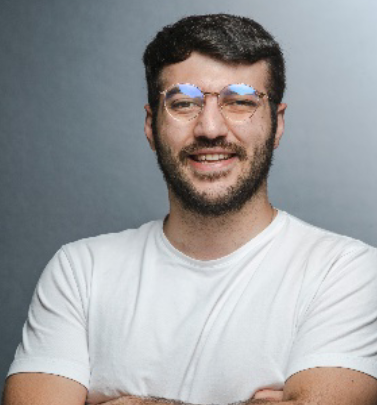
Hassan H. Fakih, PhD
RTI/ UMass Chan Medical School
About Hassan H. Fakih, PhD
PERSONAL STATEMENT/MOTIVATION:
The OTS Society has had a profound impact on my life and career. As a graduate student in materials chemistry focused on drug delivery, I attended the 2019 OTS meeting, where I interacted with leading scientists and trainees in the field. This experience inspired me to pivot my research to oligotherapeutics. The meeting offered top-tier science, productive networking opportunities, and a strong focus on fostering the career and growth of young scientists.
Since then, I have actively engaged with the OTS community, attending the meeting every year, and helping host the educational webinars offered by the society. I also had the privilege to serve as a trainee representative to the board for two years. I have benefited immensely from the rich scientific environment and the mentorship and support of OTS members. I am eager to serve on the OTS board to give back to the community that has supported me so much. Since my first election to the board (2023), I have co-led the establishment of the OTS Mentorship Program, which pairs scientists in the community with experienced leaders to help elevate their careers. The program has become a fixed offering, with increasing participation every year.
As a board member, I would focus on three key areas:
- Supporting the next generation of scientists and trainees. The OTS community has a vibrant culture of mentorship and collaboration. I would work to strengthen these programs and create new opportunities for young scientists to network, learn, and grow.
- Expand on the educational reach of the society by helping to grow the educational webinars and organize regional meetings across the world (Asia, middle east, Australia)
- Continue to work and improve on the mentorship program, by organizing new activities and implementing feedback from the society to maintain high standards.
I am confident that my skills, experience, and passion for oligotherapeutics would be a valuable asset to the OTS board. I am committed to serving the community and helping to advance the field.
Biography:
I am a Postdoctoral Associate in the lab of Prof. Anastasia Khvorova at the RNA Therapeutics Institute at UMass Chan Medical School. My research focuses on improving the extra-hepatic delivery of siRNA therapeutics using self-assembled nucleic acid particles and specific protein-binding conjugates. I am particularly interested in applying this research to develop treatments for cancer, muscle diseases, and CNS disorders, with a focus on multi-targeting strategies.
I received my B.Sc. in premedical chemistry from the American University of Beirut in 2016 and my Ph.D. in chemistry from McGill University in 2021. My Ph.D. work focused on developing DNA nanocarriers for nucleic acid therapeutics. I developed DNA-based nanocarriers with characteristics that enable them to move faster into clinical trials, such as improved cost-effectiveness, biocompatibility, specificity, and stability. The work resulted in the development of sequence-controlled nucleic acid-polymer conjugates that assemble into spherical nucleic acids (SNAs) with stimuli-responsive activation, as well as chemically modified SNAs that show promising efficacy without transfection agents.
Some of this work has been recognized by the OTS community, where I have received several awards for my research, including the Dr. Alan Gewirtz Memorial Scholarship for Graduate Students in 2021 and for Postdoctoral Fellows in 2024. I have also been actively involved with the OTS Society since 2020. I have helped host many of the OTS monthly webinars and served as a trainee representative on the board for the 2022-2023 term. In 2022, I hosted the next-generation session in Phoenix and co-led the establishment of the first official cohort of the OTS Mentorship Program, which is now a fixed yearly offering with an annual budget to support mentees in attending the annual meeting and other mentorship events.
Affiliations:
- Scientific advisor to Banook Group on nucleic acid therapies (Banook Group, based in Nancy France, Montreal Canada, and Boston USA) 2022-active
- OTS board member 2024-2025
- Trainee Representative board member to the OTS 2022-2023
- Controlled Release Society member (CRS and Canadian Chapter –CRS, VP communications)
- Hereditary Disease Foundation Fellow 2022-2024
- Society for the Advancement of Science and Technology in the Arab World (SASTA) member
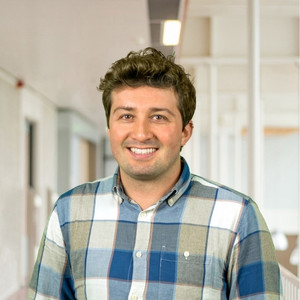
Alex Garanto, PhD
Radboud university medical center
About Alex Garanto, PhD
PERSONAL STATEMENT/MOTIVATION:
My first OTS was in Leiden back in 2015. At that meeting, I had the chance to give my first international talk on my postdoc work on antisense oligonucleotides for CEP290. I was amazed by the meeting, how the community made me feel and the feedback I got after my talk. Since I became a junior independent principal investigator in 2019, I have joined all Oligo meetings. In fact, in 2021 I had the great honor of receiving the Mary Ann Liebert, Inc. publishers Young Investigator Award and in 2022, Prof. Aartsma-Rus and Prof. Corey believed in me to serve as the scientific co-chair of the 2023 Annual Oligo meeting which was held in Barcelona. After that, I was elected as part of the board of directors, where I had the chance to return to the OTS community with their trust in me. I would like to continue serving on the board of directors to help maintain the continuity and spirit of the society and bring new perspectives from a relatively young European academic, and actively promoting diversity, equity and inclusion at multiple levels. This commitment was already visible during the OTS 2023 in Barcelona where we achieved balanced representation across gender and academia/industry, supported geographic inclusion, and encouraged early-career researchers. As such, I have been actively supporting mentorship and creating opportunities for the next generation of scientists who will play a crucial role in further developing and shaping our community. For example, I have participated in the mentoring program, and this year I co-organized an educational session designed to help newcomers gain knowledge on various aspects of oligonucleotide therapeutics.
I greatly enjoy building new connections and collaborating with colleagues from around the world. I have served on the management committee of the European network DARTER (2018–2022), I coordinate the European doctoral network EFFecT (2025–2028), and I co-founded the Dutch Antisense Therapeutics Society, which organizes an annual symposium. This initiative aims to strengthen the antisense field in the Netherlands and neighboring countries by providing an accessible platform for young researchers to connect and interact with both national and international experts in the field.
BIOGRAPHY:
I started my PhD project in the field of Genetics after finishing my studies in Biology at the University of Barcelona. After my PhD, I studied the contribution of Ubiquitin and Sumo signaling to the determination of photoreceptor cell fate. In October 2012, I moved to the Netherlands as a postdoc in the Blindness Genetic Therapy group at the Department of Human Genetics of the Radboudumc. During this time, I contributed to the development of novel therapeutic interventions for inherited retinal disorders based on antisense technology for CEP290 and ABCA4 retinal conditions. In 2017, I entered the tenure-track program which led to an Assistant Professor tenured position in 2021.Since2023, I am an Associate Professor and my research focuses on the development of molecular therapies, mainly on antisense technology, for these diseases. I share group with Prof. Collin and our group is embedded within the Departments of Pediatrics and Human Genetics and it is closely connected to the Translational Metabolic Laboratory and the Department of Ophthalmology of the Radboudumc, facilitating close contact between clinicians, researchers and patients. During the last years, our group has extensively worked on personalized medicine by developing mutation-specific RNA-based strategies to treat disease. Besides designing new therapeutic strategies, another important aspect of our research is to find reliable and suitable models to identify molecular mechanisms of disease and test potential new drugs. For that reason, we are actively working on the development of patient-derived cellular models and potential read-outs to not only elucidate the pathophysiological mechanisms and identify therapeutic targets, but also test the efficacy, safety, (bio)distribution and longevity of therapeutic molecules. Our group is well connected to several European consortia, such as CHARLIE (CHAnging Rare disorders of LysInE metabolism), ERTC (European Retinal Therapeutics Consortium), the terminated DARTER (Delivery of Antisense RNA ThERapeutics) European Action as well as the national hDMT organ-on-chip network or Dutch Center for RNA Therapeutics. More recently, the spirit of DARTER was continued in a European doctoral network called EFFecT (A European Training Program to Foster the Full Therapeutic Potential of Antisense Technology across Tissues), in which we aim to train 12 doctoral candidates in 8 different countries.
AFFILIATIONS:
- Research Group Leader at the Radboudumc
- Co-founder and Board member of the Dutch Antisense Therapeutics Society that organizes the annual Dutch Antisense Therapeutics Symposium (www.dutchantisense.org)
- Member of the Oligonucleotide Therapeutics Society
- Member of the Netherlands Society for Gene and Cell Therapy (NVGCT)
- Member of the European Society for Gene and Cell Therapy (ESGCT)
- Member of the Association for Research in Vision and Ophthalmology (ARVO)
- Vice-chair of the hDMT Eye-on-Chip working group
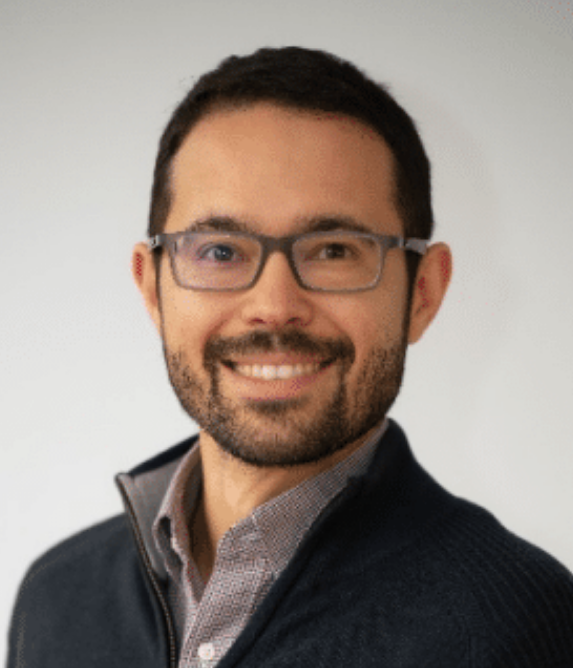
Bruno Miguel da Cruz Godinho, PhD
Atalanta Therapeutics
About Bruno Miguel da Cruz Godinho, PhD
PERSONAL STATEMENT/MOTIVATION:
My journey with the Oligonucleotide Therapeutics Society (OTS) began in 2016 at the Annual Meeting in Montreal. The quality of the meeting and the energy of the scientists/members that make the fabric of this community was astounding. Adding a passion for RNA therapeutics, and it was hard not to get hooked! Since then, the OTS has been my go-to platform for learning about the latest advances in genetic medicines and finding inspiration from leaders in the field.
For the past four years, it’s been an honor to serve on the OTS Board. I’ve been fortunate to witness the dedication that goes into every decision, and I’ve actively contributed in various ways.
During my two terms, I chaired the location committee, which defines where the annual meeting is going next; and supported the activities of a variety of subcommittees. Contributed in several instances, as a poster reviewer, travel grant reviewer, and mentor on the mentorship program. This year I had the privilege of being nominated co-chair of the Annual Meeting in Budapest (Hungary); and have previously served on the organizing committees for the 2021 and 2023 Annual Meetings, where I co-chaired pre-clinical sessions. Finally, I have also supported other OTS-backed activities like local delivery meetings, such as the 1st Symposium on Oligonucleotide Technologies & Therapeutics in Portugal.
The OTS has provided me with invaluable opportunities, and I am committed to give back and offer my unique perspective. Thus, it would be a privilege to continue to share the responsibility of shaping the future of the society, as well as to help educate/train the next generation of oligonucleotide scientists and the broader community on the transformative potential of oligonucleotides in human medicine.
BIOGRAPHY
Bruno Godinho received his foundational pharmacy training at the Lisbon School of Health Technology (ESTESL, Portugal) where he obtained his Bachelor’s degree. During his time in college he undertook research internships at Utrecht University (Utrecht, TheNetherlands) and Universidade NOVA de Lisboa (Caparica, Portugal), which were key shaping his interest in pursuing a career in scientific research. His Master degree in Clinical Pharmacology obtained at the University of Glasgow (Scotland, UK) fostered, for the first time, his interest in gene therapy and gene silencing. He later received his Doctorate degree from University College Cork (Cork, Ireland) where he studied formulation-based approaches for the delivery of therapeutic oligonucleotides to the central nervous system (CNS). He then joined Prof. Khvorova’s Lab at the RNA Therapeutics institute (UMass Medical School) as a postdoctoral fellow to learn and gain experience in the design and delivery of fully-modified conjugated therapeutic oligonucleotides. During his training,he made significant contributions towards the identification of neuroactive siRNA scaffolds that enable potent and sustained gene silencing in the CNS, without the need for synthetic formulation. In 2016, he received the Milton-Safenowitz Post-Doctoral Fellowship Award from the Amyotrophic Lateral Sclerosis Association (ALSA) to support his research. Bruno is also the recipient of other career awards, including the Dr. Alan M. Gewirtz Memorial Scholarship Award (Oligonucleotide Therapeutics Society), the STAT 2019 Wunderkind Award (STAT News) and a Silver Medal from the Polytechnic Institute in Lisbon (Instituto Politécnico de Lisboa). While a postdoc, Bruno acted as an Adjunct Professor at the Lisbon School of Health Technology (ESTESL, Portugal) and Guest Lecturer at the Instituto de Engenharia de Lisboa (ISEL), teaching pharmacy-related subjects and advanced therapeutics.
At Atalanta Therapeutics, a CNS-focused RNAi therapeutics company, Bruno leads platform development and innovation efforts, and is the lead in vivopharmacologist for several internal and partnership programs.
AFFILIATIONS:
- External Scientific Advisor at the Health & Technology Research Centre (Escola Superior de Tecnologia da Saúde de Lisboa (ESTESL), Lisbon, Portugal)
- Guest Lecturer in Advanced Human Therapies, Master Program in Biomedical Engineering (Instituto Superior de Engenharia de Lisboa/ESTESL, Lisbon, Portugal)
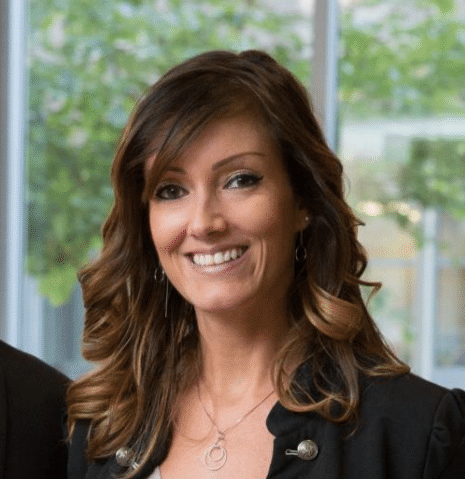
Aurelie Goyenvalle, PhD
UMR1179-University of Versailles, France
About Aurélie Goyenvalle, PhD
PERSONAL STATEMENT/MOTIVATION:
My journey with the Oligonucleotide Therapeutics Society began in 2011 when I attended my first OTS meeting in Copenhagen. Over the years, I have witnessed the OTS community’s growth and its commitment to fostering exceptional science, encouraging collaboration between academia and industry, and nurturing a vibrant exchange between scientists at different career stages.I am proud to have received two prestigious awards from the society: the Dr. Alan M. Gewirtz Memorial Scholarship Award in 2011 and the Mary Ann Liebert Publishers, Inc. Young Investigator Award in 2016. These serve as a reminder of my commitment to advancing the field of oligonucleotide therapeutics and the kind recognition and support I have received from the OTS community.
One of the most fulfilling aspects of my involvement in OTS has been my role in the annual meetings. I had the privilege to be a part of the organizing committee for the past two annual meetings in 2022 and 2023. These experiences have allowed me to contribute to the annual meetings’ success, and I have found great reward in this collaborative endeavor.
Beyond my own research projects, I have actively participated in building networks that promote the application of oligonucleotide technology in Europe. As a founding member and management committee member of the European networks “Networking towards clinical application of antisense-mediated exon skipping” (COST Action BM1207) and “Delivery of Antisense RNA therapeutics” (COST Action CA17103), I have played a pivotal role in connecting European experts in the field. In the latter network, I led the working group on Safety and Toxicology, further underscoring my dedication to sharing knowledge and promoting the safe and effective application of oligonucleotide therapeutics.It would be a great pleasure to serve on the OTS board of directors to contribute to the society’s mission, particularly its commitment to education and inclusivity, and to work with the dedicated individuals who share a passion for advancing oligonucleotide therapeutics.
BIOGRAPHY
Aurélie Goyenvalle obtained her PhD in Virology at the University of Paris VII in 2006 from her work at Genethon in France, where she developed an exon-skipping gene therapy strategy for Duchenne muscular dystrophy (DMD) using AAV vectors encoding U7snRNA constructs carrying antisense sequences. She then joined Pr. Kay Davies’ laboratory at the University of Oxford as a post-doctoral scientist supported by an EMBO fellowship. During her postdoc in Oxford and subsequent position at the Medical Research Council (MRC),she developed various splicing modulation approaches for neuromuscular and neurodegenerative diseases, including peptide-conjugated antisense oligonucleotides.
In 2011, she joined the Institute of Myology in Paristo investigate splice switching approaches using novel antisense oligonucleotides and in 2012, she was awarded a Chair of Excellence program to establish her own group at the University of Versailles to develop novel RNA based technology for the treatment of neuromuscular diseases. She notably demonstrated the therapeutic potential of a novel class of AONs made of tricyclo-DNA (tcDNA), which displays unique pharmacological properties and unprecedented uptake in many tissues after systemic administration.
In 2015, Aurélie was appointed a permanent research scientist at INSERM and in 2020 Director of Research to pursue this line of research. Aurélie Goyenvalle is currently directing the laboratory Biotherapies for neuromuscular diseases at the University of Versailles (UMR 1179) focused on gene and antisense therapies for the treatment of neuromuscular disorders.
AFFILIATIONS:
- Member of the Oligonucleotide Therapeutics Society
- European editor of Nucleic Acid Therapeutics
- Editorial board of Molecular Therapy Nucleic Acids
- Reviews editor of Gene Therapy
- Founding member of the Delivery of Antisense RNA therapeutics (DARTER) network
- Member of the extended TREAT-NMD Advisory Committee for Therapeutics (TACT)

Shuling Guo, PhD
Vertex Pharmaceuticals
About Shuling Guo, PhD
PERSONAL STATEMENT/MOTIVATION:
Since I first joined Isis/Ionis in 2004, the OTS conference has consistently held a special place on my calendar. It has been a forum where I stay connected to the latest scientific breakthroughs in the oligonucleotide therapeutic community and, just as importantly, where I reconnect with longtime colleagues and forge new relationships. Over the years, these gatherings have proven invaluable for sparking collaborations and driving innovation across our field.
Earlier this year, I began an exciting new chapter as Head of Biology and Associate Site Head at Vertex Pharmaceuticals in San Diego, where I lead research initiatives in nucleic acid therapeutics and targeted delivery. While my professional home has changed, my commitment to the OTS mission remains steadfast. I am deeply grateful to the seasoned leaders within OTS who have served as role models and mentors throughout my career. Their guidance has shaped me as both a scientist and a leader, and it now inspires me to give back to the community that has given me so much.
My candidacy for the OTS Board of Directors is backed by a set of qualifications that uniquely position me to contribute effectively:
- Diverse Expertise in Oligonucleotide Research – Over the years, I have led drug discovery programs spanning cardiorenal, metabolic, pulmonary, hematological, and rare diseases, alongside core research efforts in non-coding RNA, nonsense-mediated mRNA decay, and autophagy. My experience spans multiple modalities—including single-strand ASO, double-strand siRNA, and CRISPR gene editing—and I have published over 80 scientific articles on oligonucleotide-related topics.
- Robust Network Across Academia and Industry – I have built collaborations with academic investigators and pharmaceutical partners, fostering connections across diverse therapeutic areas and enhancing my ability to navigate and contribute meaningfully within the expanding OTS community.
- Leadership and Service –
- Mentorship: Guiding postdocs, sponsoring internship programs, and serving on career development panels.
- Conference Organization: Co-organizer for OTS 2025, advisory committee member for TIDES and session organizer/chair for multiple scientific conferences.
- Results-Oriented Leadership & Community Engagement: – A consistent track record of delivering high-quality outcomes through strategic thinking and collaborative execution, including co-chairing the OTS Education and Community Building Committee (including the Journal) to launch impactful initiatives such as free access to the OSWG whitepapers and other programs that foster education and connection within the global oligonucleotide community.
In summary, my transition to Vertex broadens my perspective on how oligonucleotide therapeutics can be advanced across different platforms and organizations. My qualifications, combined with a deep passion for the OTS mission, position me to help the Society grow and thrive. I am eager to leverage my experience to support OTS in shaping the future of oligonucleotide science and therapeutic innovation.
BIOGRAPHY
My name is Shuling Guo. I earned my Ph.D. in Molecular Cancer Biology from Duke University and completed my postdoctoral training at HHMI/UCLA. I began my career in oligonucleotide therapeutics at Ionis Pharmaceuticals in 2008, where I held positions of increasing responsibility and most recently served as Vice President of Drug Discovery.
In 2025, I joined Vertex Pharmaceuticals as Head of Biology and Associate Site Head at the San Diego research site. In this role, I lead research efforts in nucleic acid therapeutics and targeted drug delivery, guiding discovery programs from early biology through candidate selection and fostering collaboration across multidisciplinary teams. My work spans multiple modalities—including antisense oligonucleotides (ASO), small interfering RNA (siRNA), CRISPR gene editing, and small molecules—with a focus on advancing next-generation medicines for patients.
Over the course of my career, I have contributed to the discovery and development of numerous oligonucleotide therapeutics, including compounds that have achieved regulatory approval (e.g., Tegsedi® and Wainua™), or are in various stages of clinical development. My research leadership has also encompassed exploratory areas such as noncoding RNA, autophagy/mitophagy, and nonsense-mediated mRNA decay. To date, I have authored or co-authored over 80 scientific publications, most focused on the mechanisms and therapeutic applications of RNA-targeting technologies.
AFFILIATIONS
- Member, Oligonucleotide Therapeutics Society (OTS)
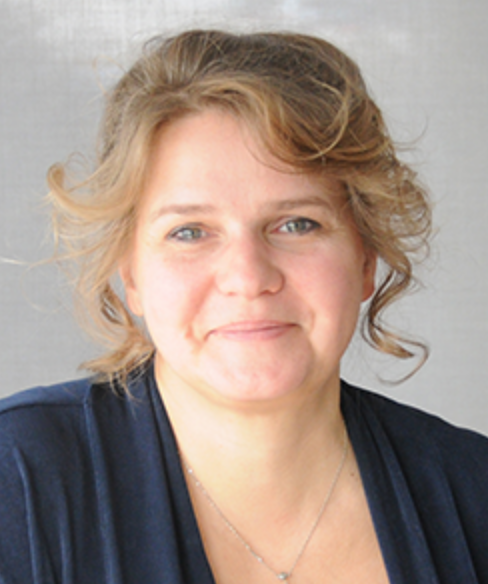
Anastasia Khvorova, PhD
UMASS Chan Medical School / RTI
About Anastasia Khvorova, PhD
PERSONAL STATEMENT/MOTIVATION:
I have dedicated my scientific career to understanding the fundamental principles behind the development of RNA and siRNA, envisioning them as the next class of therapeutics with the potential to revolutionize how we practice medicine.
I served as an OTS board member from 2010 to 2018, contributing to the definition of the OTS as it stands today. I believe that our field is on the verge of transformative change, and the role the OTS plays is crucial. My unique blend of experiences as an academic PI, pharma executive, co-founder of a small biotech, and adviser to numerous young scientists positions me ideally to guide society into the next chapter.
I am a firm believer in the importance of academia-industry integration and collaboration for our future progress. I hope to serve as a liaison, offering a clear historical perspective and an intimate understanding of the needs and challenges in both worlds.
BIOGRAPHY
Anastasia Khvorova, Ph.D., has over 20 years of experience developing oligonucleotide technology and therapeutics. She is the Remondi Family Chair in Biomedical Sciences and professor at the RNA Therapeutics Institute and Program in Molecular Medicine at the University of Massachusetts (UMass) Chan Medical School. Her lab combines hardcore organic and oligonucleotide chemists with RNA biologists and pharmacologists to develop novel approaches and solutions to understanding natural and therapeutic RNA trafficking and delivery. Dr. Khvorova founded the UMass Nucleic Acid Chemistry Center, the only nonprofit facility in North America with expertise and capacity for complex RNA molecule synthesis at scale and numbers. Dr Khvorova’s laboratory has trained dozens of next-generation scientists expanding the progress of oligonucleotide therapeutics in North America and worldwide.
Before UMass Chan Medical School, Dr. Khvorova spent 12 years in industry in different executive positions. She has co-founded several biotechnology companies.
Dr. Khvorova is a National Academy of Inventors member with more than 150 patents and 300 patent applications. She has authored more than 100 peer-reviewed publications, including seminal articles in Cell, Nature, and Nature Biotechnology, defining the field of RNAi drug design and development. She has served as one of the early directors of the Oligonucleotide Therapeutics Society and as a Director-at-Large, and Scientific & Research Council Chair of the American Society of Gene and Cell Therapy.
AFFILIATIONS:
- ASGCTDirector at large(2020-2023)
- Editor (NAR, MTNA, NAT)
- SAB (Atalanta, Evox, Comanche, Alltrna, Prime Medicine, Aldena)
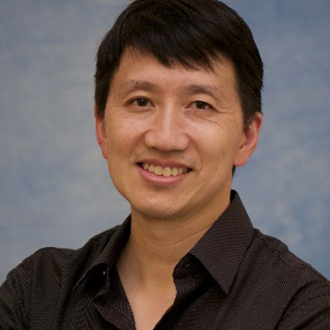
Timothy Yu, MD, PhD
Harvard/Boston Children’s Hospital
About Timothy Yu, MD, PhD
Boston Children’s Hospital
PERSONAL STATEMENT/MOTIVATION:
I owe a great debt to the Oligo Therapeutics Society community, which welcomed me in 2017 when I, brand-new to the antisense oligonucleotide field. Many members stepped up to advise us (Art Krieg, Susan Srivatsa, Fran Wincott, Frank Bennett, Frank Rigo, Firoz Antia, Sudhir Agrawal, Kim Tyndall, to name only an incomplete few) in our effort to develop a clinical-grade antisense oligonucleotide (milasen) for a young child with a fatal neurogenetic disorder. I’d like the opportunity to repay that favor through my service. In the years since that case, I have benefited greatly from collaborations with many additional OTS members too numerous to name.
I have a long track record of collaborative science, having taken active roles in large scientific consortia like the Autism Sequencing Consortium and the Simons Foundation for Autism Research for the past ten years.
If elected to the OTS Board, I look forward to learning from fellow board members, and will gladly offer my genetics and clinical expertise in return. In particular I hope to be able to bring a unique perspective due to my ongoing efforts to advance the use of oligonucleotide technologies for individualized / N-of-few medicines. I serve as one of the founding contributors to the n-Lorem foundation, the founder of the N=1 collaborative, and an advisor to several other relevant efforts (e.g. the Dutch Center for RNA Therapeutics, or the brand-new Ultra Rare Disease Gene Therapy Network sponsored by the National Institute of Neurological Disorders and Stroke). The OTS has a real opportunity to lead in this field as we grapple with the clinical, scientific, and regulatory opportunities and challenges in this space. Solving these challenges will not only benefit oligonucleotide work, but create a platform for individualized medicine using other nucleic acid-based therapies (siRNA, morpholinos, mRNA, CRISPR, etc.).
BIOGRAPHY:
Dr. Yu is a neurogeneticist at Boston Children’s Hospital and Harvard Medical School. He obtained his undergraduate degree in Biochemistry at Harvard College. As a MD-PhD student at UCSF, he used molecular genetics to elucidate basic mechanisms of neuronal attraction and repulsion in the wiring of the C. elegans nervous system, and authored or co-authored papers in Science, Neuron, Nature Neuroscience and Nature Reviews Neuroscience. He then completed neurology residency at Massachusetts General Hospital and Brigham and Women’s Hospital. He joined the faculty in the Division of Genetics and Genomics at Boston Children’s Hospital, and is currently Associate Professor at Harvard Medical School and an Associate Member of the Broad Institute. He leads a cross-disciplinary research group that operates at the intersection of genomics, neurobiology, and bioinformatics. Tim’s group was one of the first in the field to deploy high throughput sequencing methods for human genetics, and today continues to use advanced sequencing and analytics to understand the genetic architecture of autism, and other disorders of brain development. His lab has also translated these tools to the hospital, conducting analyses of rapid-turnaround genomic sequencing in both the neonatal intensive care unit and the newborn nursery. Finally, Tim’s group has pioneered disruptive approaches to accelerating treatments for orphan genetic diseases. Beginning with a young girl with Batten disease (a progressive, fatal, neurodegenerative disorder), his team demonstrated it was possible to go from genetic diagnosis to development, testing, and deployment of a novel investigational drug, using an intrathecally delivered, patient-customized oligonucleotide, in just one year’s time. His laboratory continues to work with clinicians, scientists, industry, policymakers, rare disease advocates, and the FDA to streamline this path as an option for children suffering from rare, orphan diseases, and currently has five clinical therapeutic programs in the IND or pre-IND phase for individuals with ultra-rare, orphan neurogenetic conditions.
AFFILIATIONS:
- Staff Physician, Division of Genetics & Genomics and Department of Neurology, Boston Children’s Hospital
- Associate Professor, Harvard Medical School
- Associate Member, Broad Institute of MIT and Harvard
- Scientific Advisory Board, Mila’s Miracle Foundation
- Scientific Advisory Board, Dutch Center for RNA Therapeutics
- External Consultant Board, Ultra Rare Disease Gene Therapy Network, National Institute of Neurological Disorders and Stroke
Current OTS members are encouraged to participate in the BOD election which will be open through December 08, 2021. All current members have been emailed a link to the ballot which can also be reached here.
If you did not receive the email or have questions about the status of your membership, contact us at info@oligotherapeutics.org.


